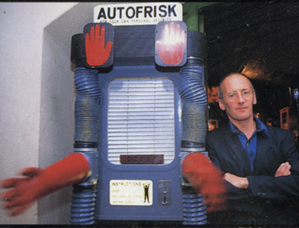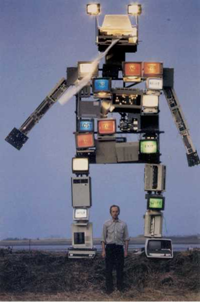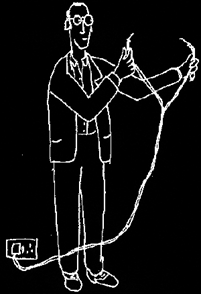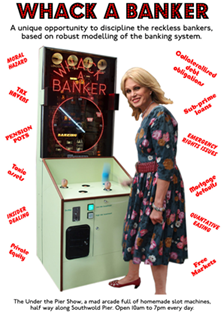The Secret Life of Engineer, Cartoonist, Show Creator Tim Hunkin

Bruce Springsteen sang; "There's fifty-seven channels and nothin' on,"
but in fairness there’s been a wide variety of excellent science programming
on for a long time. There are shows that interest me, others that I make a
point to try to watch, and a select few that I set my schedule around. For
the latter, I don’t answer the phone and hope that no one walks in the room
and wants to start a conversation while I’m watching. "The Secret Life of
Machines" was solidly in that third group. When the Jazz instrumental "The
Russians are Coming" started playing I was in my happy place. The show was
hosted by Tim Hunkin and his partner Rex Garrod, and ran in the early ‘90s
in the UK and on the Discovery Channel in the US. Each show was dedicated to
a specific machine or piece of technology that’s common to everyday life.
"The Secret Life of Machines" was a little unusual - unorthodox,
but in a very creative and clever way. A mixture of animated cartoon parody,
mechanical art, and a history and explanation of the featured subject.
I was always left with a greater appreciation of that particular machine after
the show was over.
Checking out YouTube one evening I was thrilled to see that there
was a good selection of these shows. I watched "The Secret Life of
the Word Processor" and then decided to try to contact Tim Hunkin. I
was delighted when he agreed to do an interview for us. Below are
some questions and the answers he responded with.
Q. When you were first studying to be an engineer what did you imagine your
career would be?
I didn't know. I was still trying to work out what I wanted to do in my 40s.
I'm delighted I do seem to have found out now I'm 58.
Q. You’re probably most recognized for your show "
The Secret Life of Machines" which ran on The Discovery Channel in the US. What
events led up to the creation and development of that show?
I'd been happily working as a cartoonist for the Observer, a UK Sunday
newspaper, for ten years when the place started to get really unstable, with
a new editor every few months. I knew my days were numbered and my agent
suggested I try writing something for TV. I don't know if its true but I
suspect it is, that my proposal to explain how a washing machine worked
landed on the desk of the controller (Jeremy Isaacs) just after his wife had
died so he was struggling to use his washing machine for the first time.
Q. In the show you would often take apart the particular machine that was
featured and display the workings of its separate components. One of my
favorites was the digital watch, where you actually displayed the tiny
components working individually. I used to try to do things like this when I
was a kid but always failed miserably. What kind of preparation did it take
in order to make it look easy on the show?
Lots of preparation. It doesn't cost much to have one person ferriting
around for ages. I was lucky to have over a year to make each of the three
series. I don't understand why most TV seems to be made in such a rush.
Q. "Secret Life…" was very unique in the way that you created illustrative
cartoons showing humorous examples of how the evolving technology interacted
with human behavior. What kinds of observations in your life did you derive
these sketches from?
 They always seemed obvious to me, maybe because I always was an outsider .
If you spend your life making washing machines you become blind to the
frustrations that everyone else knows only too well.
They always seemed obvious to me, maybe because I always was an outsider .
If you spend your life making washing machines you become blind to the
frustrations that everyone else knows only too well.
Q. You often began and ended the show with works of mechanical art. The giant
exploding video tube monster at the end of the "Word Processor" show was
especially impressive. I imagine a lot of enthusiasm went into creating
that. Were there show producers that you had to fight with in terms of how
far they would let you go?
Not really. I was fortunate that I had been doing similar stunts for a
theatre company so they never cost a lot. There were more problems with the
budgets for the external location shoots and the archive footage.
Q. Do you have a favorite between the nuts-and-bolts engineering, cartoon work,
or mechanical art creation as far as what gives you the most fun and
satisfaction?
 I prefer to be in my workshop making something, I get itchy sitting at my
desk on the computer for more than a couple of hours.
I prefer to be in my workshop making something, I get itchy sitting at my
desk on the computer for more than a couple of hours.
Q. Are you more fascinated by mechanical or electrical workings? Why?
Its the combination that's fun. At the moment there are lots of people who
combine a lot of clever software with some limited physical element. I'm in
a great position because very few people do it the other way round - lots of
physical stuff with a bit of clever computing. There's sp much potential.
Q. You did a TV show in 1982 called "Why Things Go Wrong". You explained how
the most reliable technology often comes from engineers building on their
past experience and gave the automobile as an example, where its basic
design has changed very little over decades. Would the personal computer
also be an example? Current models are obviously much faster, with more
storage, a wider buss width, and a much higher transistor count, but it
seems the fundamental architecture is still much like the original PC.
I guess computers have now reached a similar maturity. They are now pretty
reliable and the software works well. But just as with cars, the companies
need to get you to replace their products. So Windows 7 is great for them,
but the prospect of having to buy lots of new stuff is really irritating to
most ordinary people like me.
Q. What’s been your favorite project so far in your career?
I'm proud of the Secret Life films because I get so many letters from young
engineers who chose their career because of watching them. But I'm not a
natural TV person, I'm happier just making stuff. The best things I've made
are my 'Secret Life of the Home' gallery in the London Science museum, and
my 'Under the pier show' arcade which is still evolving.

Q. Do you have a project that you dream of but haven’t been able to do yet?
I'm running out of space in my arcade. I fantasize about larger simulator
rides and an 'out of this world' science fiction visitor attraction. And if
my body gives up before my brain. I'm going to write a book about
electricity.
Q. Judging from how you’ve observed technology evolving what do you think might
be the next marvel of invention?
I was never any good as a futurologist, I just love all the stuff we've got
already. I can't understand why people aren't more curious about basic stuff
like electricity, its so magical.
Q. What would be your best advice for both aspiring and practicing engineers?
Don't spend your life on the computer. Its a real problem that everything
now gets designed on CAD, which can make any design look convincing.
Tim Hunkin's official website
